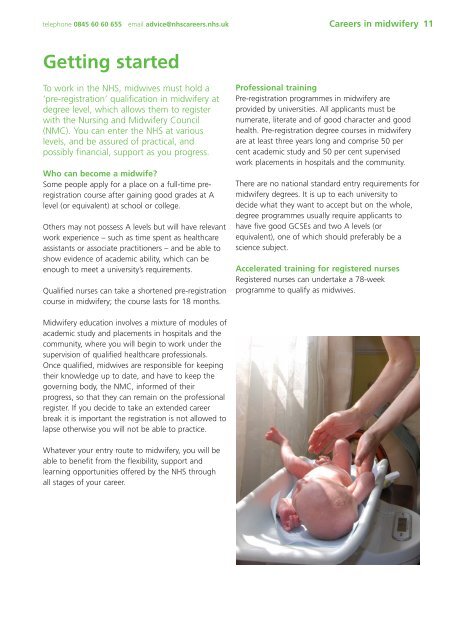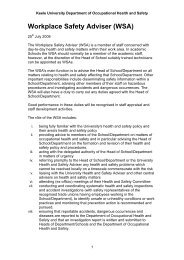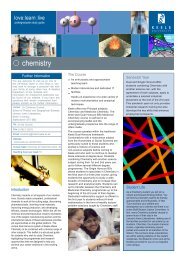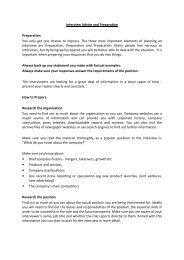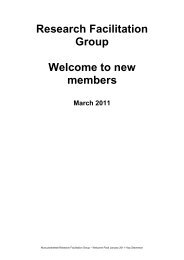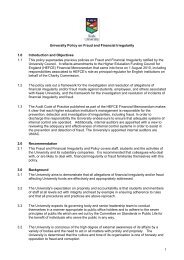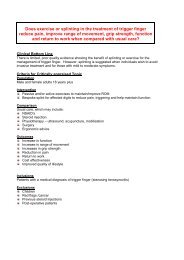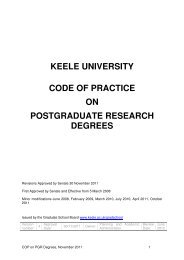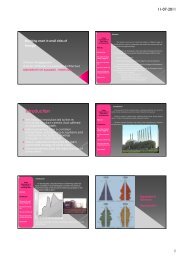NHS guide to Careers in Midwifery - Keele University
NHS guide to Careers in Midwifery - Keele University
NHS guide to Careers in Midwifery - Keele University
You also want an ePaper? Increase the reach of your titles
YUMPU automatically turns print PDFs into web optimized ePapers that Google loves.
telephone 0845 60 60 655 email advice@nhscareers.nhs.uk <strong>Careers</strong> <strong>in</strong> midwifery 11<br />
Gett<strong>in</strong>g started<br />
To work <strong>in</strong> the <strong>NHS</strong>, midwives must hold a<br />
‘pre-registration’ qualification <strong>in</strong> midwifery at<br />
degree level, which allows them <strong>to</strong> register<br />
with the Nurs<strong>in</strong>g and <strong>Midwifery</strong> Council<br />
(NMC). You can enter the <strong>NHS</strong> at various<br />
levels, and be assured of practical, and<br />
possibly f<strong>in</strong>ancial, support as you progress.<br />
Who can become a midwife?<br />
Some people apply for a place on a full-time preregistration<br />
course after ga<strong>in</strong><strong>in</strong>g good grades at A<br />
level (or equivalent) at school or college.<br />
Others may not possess A levels but will have relevant<br />
work experience – such as time spent as healthcare<br />
assistants or associate practitioners – and be able <strong>to</strong><br />
show evidence of academic ability, which can be<br />
enough <strong>to</strong> meet a university’s requirements.<br />
Qualified nurses can take a shortened pre-registration<br />
course <strong>in</strong> midwifery; the course lasts for 18 months.<br />
Professional tra<strong>in</strong><strong>in</strong>g<br />
Pre-registration programmes <strong>in</strong> midwifery are<br />
provided by universities. All applicants must be<br />
numerate, literate and of good character and good<br />
health. Pre-registration degree courses <strong>in</strong> midwifery<br />
are at least three years long and comprise 50 per<br />
cent academic study and 50 per cent supervised<br />
work placements <strong>in</strong> hospitals and the community.<br />
There are no national standard entry requirements for<br />
midwifery degrees. It is up <strong>to</strong> each university <strong>to</strong><br />
decide what they want <strong>to</strong> accept but on the whole,<br />
degree programmes usually require applicants <strong>to</strong><br />
have five good GCSEs and two A levels (or<br />
equivalent), one of which should preferably be a<br />
science subject.<br />
Accelerated tra<strong>in</strong><strong>in</strong>g for registered nurses<br />
Registered nurses can undertake a 78-week<br />
programme <strong>to</strong> qualify as midwives.<br />
<strong>Midwifery</strong> education <strong>in</strong>volves a mixture of modules of<br />
academic study and placements <strong>in</strong> hospitals and the<br />
community, where you will beg<strong>in</strong> <strong>to</strong> work under the<br />
supervision of qualified healthcare professionals.<br />
Once qualified, midwives are responsible for keep<strong>in</strong>g<br />
their knowledge up <strong>to</strong> date, and have <strong>to</strong> keep the<br />
govern<strong>in</strong>g body, the NMC, <strong>in</strong>formed of their<br />
progress, so that they can rema<strong>in</strong> on the professional<br />
register. If you decide <strong>to</strong> take an extended career<br />
break it is important the registration is not allowed <strong>to</strong><br />
lapse otherwise you will not be able <strong>to</strong> practice.<br />
Whatever your entry route <strong>to</strong> midwifery, you will be<br />
able <strong>to</strong> benefit from the flexibility, support and<br />
learn<strong>in</strong>g opportunities offered by the <strong>NHS</strong> through<br />
all stages of your career.


